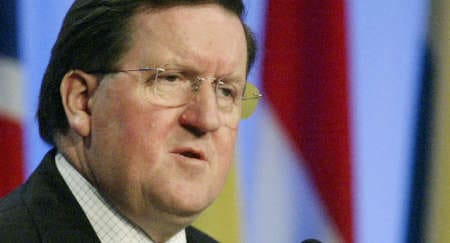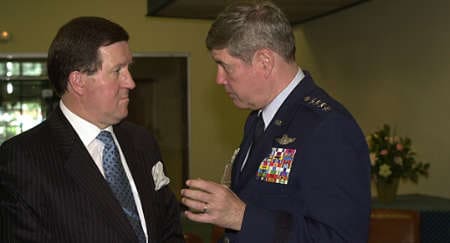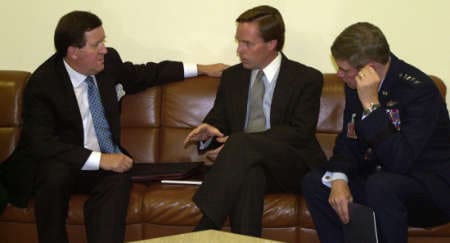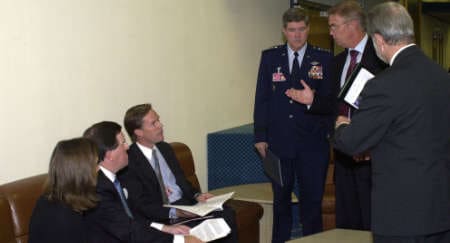Being NATO Secretary General is always a job fraught with challenges and surprises. But on 11 September, 2001, Lord Robertson had one of the most extraordinary experiences of any NATO Secretary General. Here, he recounts how the day panned out.
At NATO Headquarters in Brussels, it was just an ordinary Tuesday. One which was to turn out to be extraordinary. One which would change the world and NATO out of all recognition.
However there was one less than ordinary detail at the start of the day. In the post was a letter from Belgrade telling me that the charges and my conviction in a Milosovic kangaroo-court for war crimes during the Kosovo conflict had been formally dropped. My 25 year prison sentence was quashed. It was a story which might have made some news on any other day. But not that Tuesday.
Every Tuesday the NATO Ambassadors met with the Secretary General over lunch in a private off-the-record discussion of matters on the agenda for the following day's NATO Council. It was sacrosanct. No interruptions, no notes, no holds barred.
So, the interruption from one of my bodyguards bearing a message from my personal assistant was unprecedented. A plane had hit one of the twin towers in New York. It was surprising. But the supposition was that it was an accident.
The second interruption was serious. A second plane, and it was a major incident.
Plates were abandoned, talk ended, cars summoned and it was high speed back to HQ. I listened in my armour-plated car to the BBC World Service with growing dismay and alarm.
In my office, surrounded by senior diplomatic and military staff, we watched with the rest of the world the dramatic pictures from New York. I was then conscious that we were not simple horrified spectators - we were in a military headquarters. Not only that, we were right under the flight path of Zaventem, Brussels airport. Planes were thundering overhead as we spoke.
As the pictures of the towers collapsing magnetised the planet, I gave the order to evacuate all but essential staff and to check urgently with (Air Traffic) EuroControl that no departing planes were heading back.
An urgent meeting of the NATO Ambassadors was called. I received constant briefing on the other developments in Washington from US Ambassador Nick Burns. The attack on the Pentagon, which I had visited not long before, was particularly close to home for NATO. The failed attack on the Capitol was also stunning.
The Ambassadors meeting was sombre and grave. At that moment, we had no conclusive knowledge of the motive or nationality of the perpetrators of this atrocity – it was not so long before that the Oklahoma bomber had carried out his own home-made attack. But it certainly looked like foreign terrorism and on a grand scale.
Read more in NATO Topics: Collective defence: invocation of Article 5
We knew that something fundamental had happened and that for the world a new chapter had opened. For us round that table, at the seat of the world’s most successful defence alliance, the sincere sympathy and solidarity expressed with the people of the US was overlaid with thoughts of what all this meant for our organisation and for wider global security.
In the margins of the meeting, my officials led by Assistant Secretary General Edgar Buckley and Private Office Director Jon Day, were already working on what we must urgently do in the face of this attack. One of the most momentous options considered was whether this assault on the US meant invoking Article 5 of the North Atlantic Treaty – the self-defence clause. An attack on one state to be considered as an attack on all then 19 NATO countries.
The work on that and on NATO’s wider response was to go on overnight. Then, in the early morning, there were conversations with US Secretary of State Colin Powell and National Security Adviser Condoleezza Rice.
I insisted that Article 5 was relevant and was the ultimate act of solidarity with the people of the US. What had the self-defence clause meant if it was not valid at this dramatic moment of aggression? Doubts were raised– especially over if even one of NATO’s 19 nations was to disagree.
Here I was breaking my very private ‘Solana’ rule. My predecessor - Javier Solana - had given me sage advice before I came to Brussels. “George, never go to the Council with a proposition unless you know the answer is already ‘yes’ or at worst ‘maybe,’” he had explained. ‘If you get defeated in Council, then not only does your authority go but so does NATO’s.”
It was good advice; I ignored it.
We had a meeting, the first ever by a NATO Secretary General to the EU Foreign Ministers Council. Nobody asked about Article 5 (this, despite my raising the issue beforehand with the Belgian Foreign Minister Louis Michel of the EU Presidency). I then tabled the Draft Statement invoking Article 5. It was the first time in NATO’s 50 years it was to be activated.
Five and a half hours of consideration in 19 capitals followed. I had fraught, nerve-racking telephone conversations with Prime Ministers, Foreign Ministers and in one case, through the Foreign Minister’s mobile phone, with a whole Cabinet meeting.
By 9.20 pm, we had the answer. Unanimous support. I was drained but enormously relieved.
I read out the endorsed statement to a packed press conference, realising only as I read it out the deep significance of the historic words I was using. In both Europe and in the US, the impact was huge. Nor would it have been unnoticed in the caves of the Tora Bora Mountains where the evil criminality of the day before’s atrocity had been dreamed up.
In very different circumstances to that envisaged by the authors of Article 5 in 1949, the mighty Alliance had stood by an ally under attack. The world that day had changed, and NATO’s transformation in the post-9/11 world had begun.
Consultation prior to the meeting
- left to right -
NATO Secretary General, Lord Robertson with SACEUR, General J. Ralston
Consultation prior to the meeting
- seated left to right -
NATO Secretary General, Lord Robertson; Ambassador R.Nicholas Burns, US Permanent Representative and SACEUR, General J. Ralston.
Consultation prior to the meeting
- seated left to right -
US delegate; NATO Secretary General, Lord Robertson; Ambassador R.Nicholas Burns, US Permanent Representative;
standing - SACEUR, General J. Ralston; Ambassador David Wright, Canadian Permanent Representative and US delegate.




